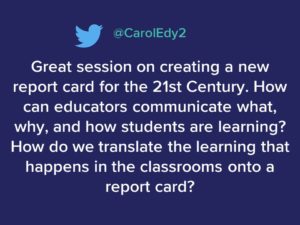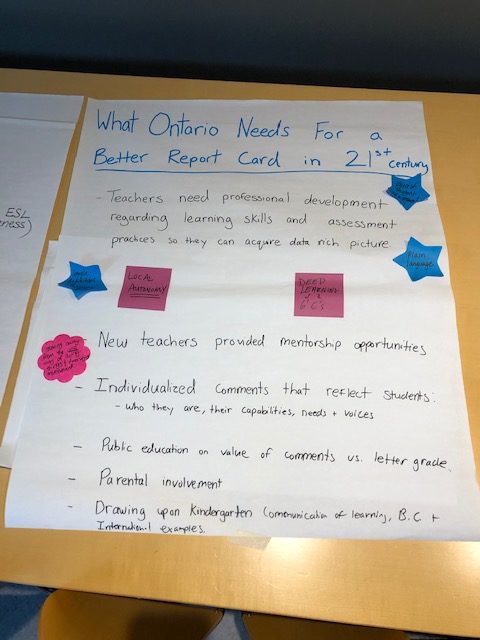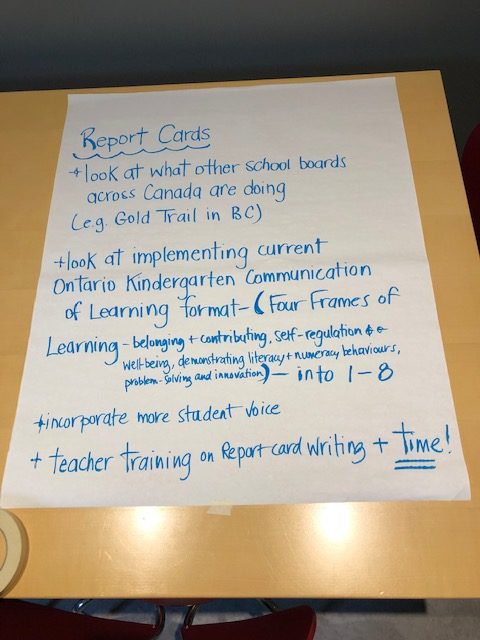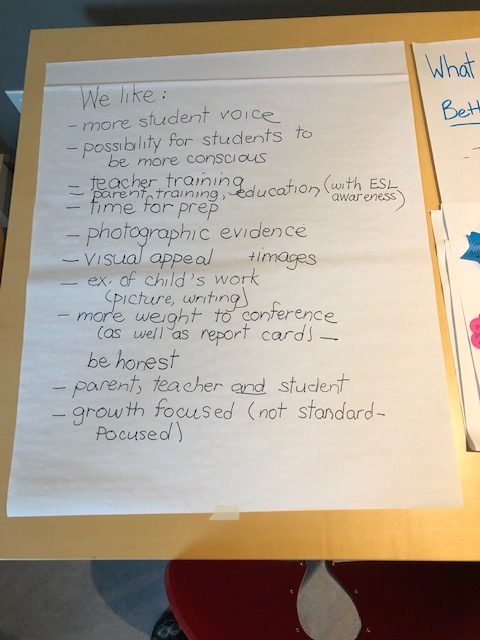Remaking the grade: Designing a new report card for 21st century skills
By Yvonne Harding, People for Education board member
It should be no surprise that the workshop about report cards at our annual conference would be lively and interactive. After all, report cards are often a point of stress for teachers, students, and parents alike. But how could a session about report cards actually be fun?
Bring in a dynamic facilitator and two enthusiastic experts, and well, magic happens…
Liz Rykert, the facilitator, began the session by interviewing the panelists, asking about the challenges with report cards, what seems to be working, and new approaches that are being tried.
A new approach to report cards in B.C.

In her comments, Teresa Downs, a superintendent with the Gold Trail School District in B.C, introduced the bold approach that her district took to revamp their elementary report cards. The changes focused on eliminating edu-jargon; incorporating student voice into the assessment process; providing parents with a clear view of the student’s development process; and reducing the emphasis on letter/number grades. The new report cards provide feedback on core competencies such as creative and critical thinking, social and personal responsibility, and positive personal and cultural identity. To help students and parents better understand these competencies, the district developed a series of posters with a list of learner traits that are included in each area. So, for example, one of the learner traits that illustrates “reflective” is “I think about what I am learning.” The posters also feature translations of key words into the three Indigenous languages spoken in the district.
Is Ontario next?
 Joanne Myers, a former member of the Ontario Ministry of Education’s Assessment Advisory Group, shared her experience working with the province to ensure that the curriculum and report cards worked coherently, used the same language, and that the language was clear and accessible to parents and students.
Joanne Myers, a former member of the Ontario Ministry of Education’s Assessment Advisory Group, shared her experience working with the province to ensure that the curriculum and report cards worked coherently, used the same language, and that the language was clear and accessible to parents and students.
During the discussion, some shared themes emerged, with both jurisdictions looking at cutting edu-jargon and increasing the emphasis on student growth and development over marks and letter grades.
The panelists’ responses stimulated more questions from those in attendance. What parents wanted to know from their child’s report card was “how is my child doing?” They also wondered, if marks were no longer the measure, how students would be compared to other students, particularly as they prepare for post-secondary education.
Participants zeroed in on the groundbreaking report cards from Gold Trail (see a sample of their primary and intermediate report cards), and Liz jumped on the opportunity to delve into why participants were so taken by this approach. Could this be the 21st century report card? What about this report card appealed to educators and parents in the room?
Building better report cards: no jargon, no banked comments, no surprises!
The participants were divided into groups and asked to think about what would make a bad report card. The results were consistent across the groups – poor quality report cards are those that are impersonal, filled with edu-jargon, use banked comments, or reveal a surprise such as a behavioral issue.
Inspired by the creative approach from Gold Trail, and determined to eliminate the elements identified as frustrating for teachers and parents alike, the groups began to design a new report card…
Gold Trail emerged as the template for the 21st Century Report Card. But if we are to change student assessment in Ontario, teachers will need professional development on the assessment practices required to create this data-rich picture; new teachers will need to be mentored; and parent involvement will be critical to the acceptance of value comments over standard letter grades.
Further reading:
- see Liz Rykert’s presentation slides.
- see our list of competencies beyond the 3R’s, including citizenship, creativity, health, and social-emotional learning.
- see the insights on assessment and measurement coming out of our Measuring What Matters project.



